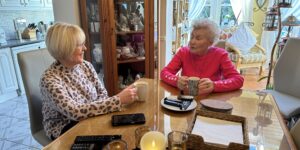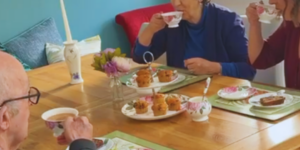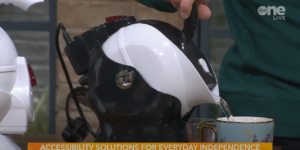Not too long ago, I was delighted to be able to sit down with (albeit digitally) Longford lad, James Cawley. In our chat we covered many topics, some about his home life and growing up in Drumlish and others about how today’s society, and how policies, structures and attitudes create barriers and are the disabling factors for the disabled community.
Meet James Cawley
Originally from Drumlish, Co. Longford, James is a proud disabled man, son, bother, husband, co-worker and friend to many.
He was born with an impairment called Arthrogryposis Multiplex Congenita (AMC). This affects his upper and lower limbs which means he uses a wheelchair (both powered and manual). James also has scoliosis of the spine and osteoporosis.
As the youngest of 9 children, James’s parents had to promote and support an independent lifestyle for him along with his Special Needs Assistant in school.
‘’I had a SNA, Breege from primary right through to secondary school. She was there to support my needs but she was always fostering that independence again any where she could just like my parents and siblings did too.’’
Off to Uni
Heading off to college is an exciting time for many. It can also be a scary time, having to start fresh, make new friends and get into a new routine. It’s a lot to take on for any 17–18-year-olds. Imagine having all these fears on top of trying to ensure you are able to access the grounds, its facilities, thinking about the transition of your support needs (special needs assistance to Personal Assistance to live independently), getting accessible accommodation and getting there by transport.
While most 5th and 6th year students are solely focused on the leaving cert and nothing else. James had to always think one or two steps ahead to make sure he was able to access things just like his classmates.
‘’As a disabled person really in Ireland, we’re quite forward thinking and we have to be forward thinking and strategic. I would almost say as well, organized in a sense that I had to think ahead when I went into 5th / 6th year about what was going to be the next step. I knew I wanted to go onto university and do geography and business and I knew I wanted to be a secondary school teacher.’’
While I myself had to travel to get to college by public transport just hopping on and off the train isn’t as easy for everyone with advanced booking of the ramp etc. However, after a brief settling in period with travel James got to know staff who were ready with the ramp to assist him onto the train. So, at a very young age, James had to think about accommodation, assistance and equal access.
‘’ I heard about a personal assistance service when in 5th/6th year, so I had to go and basically engage with the HSE at a very young age. I had to tell them I needed a personal assistant to engage fully in campus life. I had to do a needs assessment I suppose of what I would actually need and part of that was a personal assistant, as we say, lots of us, disabled people who use personal assistants, we say – they are an extension of our limbs.’’ When engaging with the HSE in identifying his supports James had to be very “firm” with them indicating that he knew his needs best – ‘’no one else did, so don’t talk about me, talk to me!’’
Fortunately, James was able to have a personal assistant and he received assistive technology and accessible accommodation from the Maynooth University Access Office. He went to Uni through the DARE route.
He studied for 5 years and received his BA in geography and business. Finally, he went onto complete his master’s in education. James ended up teaching in Maynooth for a number of years before moving to work as Policy Officer for the Independent Living Movement Ireland (ILMI) which is a National Disabled Persons Organisation led by and for Disabled People.
Activism
From an early age, James was involved in groups such as the Young Social Innovators (YSI), the learning through sport scheme for community games. In Uni, James was a part of the student’s union and the Maynooth Access Program as a leader (MAP) and was involved in numerous equality and inclusion campaigns on campus.
‘’I was always involved at a student union level and one particular campaign that springs to mind is the ‘’No Labels – No Limits’’ campaign under the SU leadership of fellow Longfordian: Siona Cahill – this was where we said labels where for jars not for people and we won a national award for it’’.
In the past, whenever something was wrong or he couldn’t access places or things equal to others, James did push awareness campaigns, campaigns around his own impairment and has had the chance to talk and engage with those that can really push a change – the Minister of disabilities. But now:
‘’I think we have evolved from that now (awareness), and its human rights and equality (disability human rights and equality) that we need to look at now and in the future ’’.
Challenges Faced
In this day and age, the disabled community still face a number of challenges that mean their day-to-day tasks are made that bit harder to achieve.
‘’We all have faced challenges, and I suppose just disabled people face extra challenges because of the way society is structured and built. I suppose the world wasn’t built with disabled people in mind but we make up a large proportion of the population and remember anyone can become disabled at any point in their lives. Our impairments are not the issue, it is our policies, structures, inaccessible housing, inaccessible transport systems and attitudes that are the issue”. Designing for diversity is designing for all”.
Transport:
There are still a lot of changes that need to happen for transport in Ireland to be 100% accessible.
‘’We have 24 hours needed in order to book a bus. It was more before! This was the same for trains but now it’s down to 4 hours and let’s face it. Getting on a train is literally putting a ramp down so there is no reason why it can’t be eliminated down to 0 hours. Allowing disabled people greater freedom and that spark of spontaneity’’.
For some disabled people, spontaneity is something they can’t quite reach that often.
‘’I should be able to rock up to a train and meet you for a coffee or a beer and say right let’s hop on the train and go to Dublin and like yourself be able to jump on with little or no advanced planning.’’ Sadly, this isn’t yet possible in Ireland.
Employment:
The COVID-19 pandemic has opened the world up to the possibility of flexible hours and work environments. James believes that this shouldn’t go by the wayside after the pandemic ends. It should not be used as an “excuse’’ to not implement reasonable accommodations for disabled people to work effectively.
‘’If we stop looking at the individual as an issue and actually look at flexible working practices and other reasonable accommodations and ask the disabled person what they need, this will in most cases work for the disabled employee. An example would be maybe they could go to the office once, twice or 3 times a week. Again, depending on their individual needs”.
Housing:
James believes that there is an assumption that all disabled people can get local authority housing/social housing.
‘’If you work and you are over the threshold you can’t. You then have to buy or rent privately, and the private rental market is not equipped for disabled people.’’ Quite often it can be like trying to find a needle in a haystack.
‘’Accessing every day in terms of independent living means we need more personal assistance services and a legalized right to it, we need more universal design in housing, and more broadly in the design of products just like the Uccello Kettle.’’
Assistance & Assistive Technology:
When it comes to independent living supports, James has a creative idea to put out there. An independent living menu: this would involve a list or a combination of supports available.
‘’While I might need a personal assistant, you may not. You could need more assistive tech such as motors on your door for example or a mainstream product like the Uccello Kettle that is really well and cleverly, universally designed.’’
The Uccello Kettle
‘’ It allows disabled people but also nondisabled people to use the product all in the same way and that’s really transformative because the Uccello Kettle allows myself, who wouldn’t be able to lift heavy objects due to my impairment but because its on a very universally designed system, it allows me to make tea until the cows come home. And I think that’s really really liberating, I even know someone who uses her feet and she wouldn’t have an issue with the Uccello Kettle because it tilts and that is why I would say Uccello should look at designing more products that allows disabled people to have full choice, control and liberation in their home and I think that’s really important because as I say if we can get all the pieces of the jigsaw like personal assistants, assistive technology, Uccello Kettles and other products and designs to fit that’s where the whole piece of the independent living jigsaw fit together and allows James to be James to live in his house like anybody else’’
ILMI
3 years ago, James left the classroom and joined the Independent Living Movement Ireland (ILMI) as their policy officer. ILMI is a national DPO and movement of Disabled people led by and for disabled people.
Their core pillars are housing, transport, employment and personal assistance services. James believes that ILMI is where he can hone his individual activism skills into a collective. He will be able to help change the individual issues faced by many at a systematic level as a collective.
‘’In work I quite often think that I am not representing myself, I am representing a movement of disabled people informed by authentic consultations and submissions that aim to eradicate barriers that Disabled people face in Ireland .’’














Leave a Comment